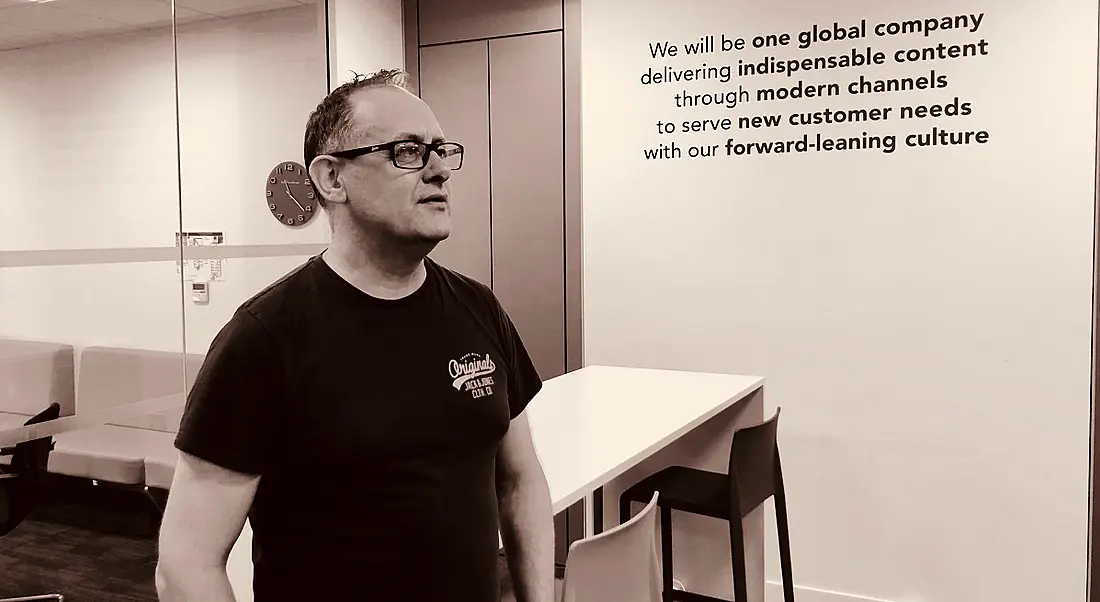Find out how software developer Stuart Grimes made the move from accountancy through the Dun & Bradstreet graduate programme.
Have you ever felt that you needed a big career change but found the idea too daunting? We spoke to Stuart Grimes about his journey from chartered accountant to software developer through the Dun & Bradstreet graduate programme.
‘I think if you have a passion for technology, you’ll be working with like-minded people at Dun & Bradstreet’
– STUART GRIMES
What did you study in college?
First time around, I studied accountancy in college and qualified as a chartered management accountant. I went back to college nearly 20 years later and studied computer science.
With the Dun & Bradstreet graduate programme, are you now working in your desired industry?
Yes, thanks to Dun & Bradstreet I am now working in my dream job.
What drew you to Dun & Bradstreet when you were seeking work as a graduate?
The opportunity to interview with Dun & Bradstreet came up through college. As I had used some of Dun & Bradstreet’s products in the past, I thought the company would be a good dovetail with my accountancy background, thereby increasing my chances of getting a role!
What expectations did you have before you began the programme?
Looking back now, I somehow had the impression that there would be a lot of instructor-led training, and that those on the graduate programme would be gradually let loose into the ‘real world’. This turned out to not be the case, as they seemed to trust me a little more than I expected.
What duties and responsibilities were you given initially?
On our first day together as a team of three, we were told that the plan was to rotate us around the various departments in Dun & Bradstreet, so that we could get as much exposure to the business as possible. When it became time to embed us in a team, we would have a say in what area we would like to work in.
We initially worked on projects that had been on the back burner for a while as ‘nice to haves’ that the other teams didn’t have the time to work on. From the start, we were an autonomous unit with a mentor who met with us once a day to help us understand the problem space. This gave us great exposure to how a real project should flow in an organisation, which is simply not something that college can prepare you for!
We got to do everything from provisioning infrastructure using Terraform to setting up pipelines with Jenkins, and everything in between. We got exposure to some amazing technologies.
Did the scope of your work change as the programme progressed?
If anything, I think the scope of work got narrower but more interesting. During the initial part of the graduate programme, I was working on projects that were not so mission-critical. As these projects were much smaller, it meant we got great exposure to all aspects of an end-to-end project flow, which I think was important. This gave me a real feel for what area I wanted to focus on in a role moving forward after the graduate programme.
When it came time to embed in a team, I asked to work in enterprise services. I am now a full-time permanent employee working as part of a team of about 15 people. Some of my team are here in Sandyford and some are in the Chennai province in India.
My work also became much more focused on understanding the business and how everything flowed through the tech stack. It was mind-blowing! It’s just amazing to be involved in shaping what happens between a user in a browser hitting ‘enter’ on their keyboard and the amount of action that goes on before that user gets a response – all within 300 milliseconds!
Can you describe a typical day in your role?
I love the fact that Dun & Bradstreet are quite flexible with working hours. It enables me to come in to work for 8am and to leave earlier if I need to.
My work consists of being allocated a story from the current sprint. I then set about delivering what is needed. It’s very important to have a properly scoped-out story and to deliver exactly that. There are always problems and challenges to overcome with whatever I am doing but this is the aspect of the work I enjoy most.
My team has our daily scrum call at 10am, which goes on for about 15 minutes. This is an opportunity to flag any issues you are having and potentially receive help and advice from other team members. Once a week we have a backlog grooming session where we try to see what needs to be prioritised and brought into our next sprint. We also estimate the effort required to delivery each story in this session as well. This meeting lasts one hour.
Lunch is generally from around 12pm to 1pm, but I tend to take a shorter lunch on Tuesdays to go to pilates. There is also daily high-intensity aerobic workout class, which is run by one of the guys here. It’s a great way to get a workout done during the day!
There are many other perks to working here that I hadn’t come across before in my previous career as an accountant. For example, there’s a pool table and table tennis table. There’s a meeting room that is designed like a mini football pitch, complete with a football to kick around! I find it great to use these facilities when trying to work through a problem or decide on a best course of action.
How do your responsibilities compare to more experienced employees?
For sure, my responsibilities are fewer than those of more experienced developers around me. But like any technical discipline, there is no substitute for experience! The developers around me are very aware of the need to pass on knowledge and are actively encouraging me to schedule time whenever I need to ask questions. For me, this is key to my future success here, as there is never a time when you feel like you cannot ask a question.
There’s a well-known concept in the industry called ‘imposter syndrome’, and coming into the industry later than others I felt it. It didn’t last long as I soon realised that the people I work with are so passionate about what they do, they can’t wait to help you out and share knowledge.
Do you feel more prepared for working life after completing this programme?
Yes, I do. I can’t think of a better way to get into an industry that is this technical but highly rewarding.
Why should someone apply to the graduate programme at this company?
I think if you have a passion for technology, you’ll be working with like-minded people at Dun & Bradstreet!




